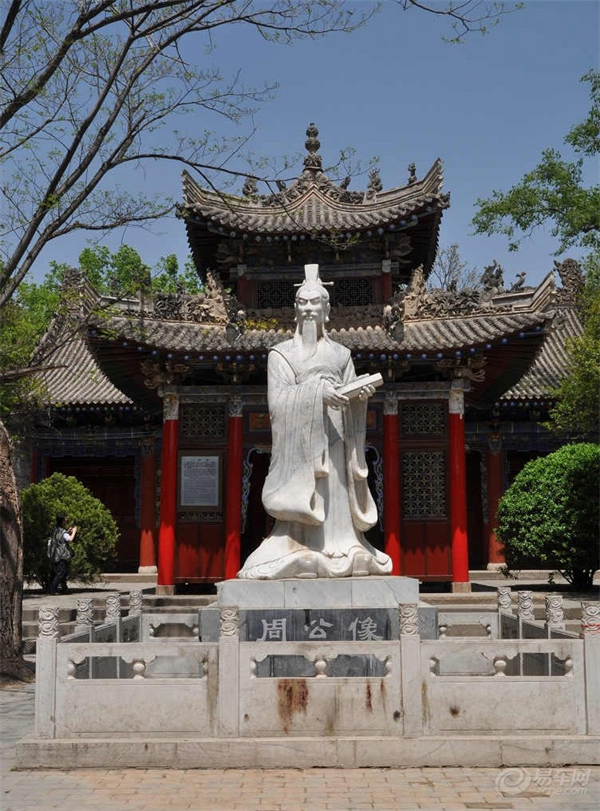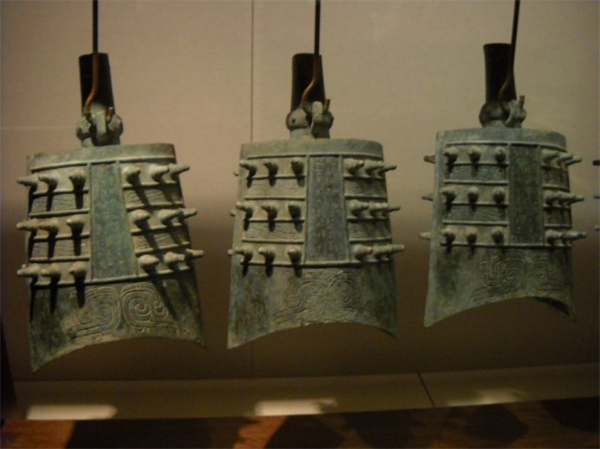A Civilization Featuring Advanced Music and Ritual System
Ji Dan, known as Zhougong or Duke of Zhou, was the younger brother of King Wuwang of Zhou. After defeating Shang, King Wuwang experienced gradual decline in his health and therefore handed the national affairs to Zhougong. After Zhougong came to the reign, he adopted the system of enfeoffment, offering his land and laborers to his subjects. Zhougong was also engaged in music and ceremonial rites as well as regulations, which helped shape the highly unified social structure lasting for the following thousands of years. His engagement in music and rituals was therefore of epoch-making significance in the Chinese civilization and history.

The statue of Zhougong
In the Zhou Dynasty, the term “ritual” is actually a general term encompassing various social systems. Zhougong’s engagement in rituals was aimed to make use of rituals to keep the social orders. Therefore, “ritual” was primarily aimed at strengthening the hierarchical social system and serving as a legitimate and charming outfit to make the highly-hierarchical society plausible for common people. Rituals are also closely related to politics and the traditional saying “Ordinary people have nothing to do with Rituals while officials are immune to criminal punishments” clarifies that rituals are only for those imperial family members and nobles while severe punishment are for those ordinary people. Under this system, each person has its due social status and has to follow the hierarchical system, or else he will be regarded as “overstepping the ritual system” and more seriously “the social rebel”.
In order to make the society friendlier to ordinary people, there should be certain regular ritual practices such as social custom, standards of politeness and daily rituals regulated for ordinary people. These social regulations, after being improved and sublimed through generations, constituted gradually the traditional moral, ethic and legal systems in ancient China. Sacrificial ceremonies form another important aspect of the ritual system. For the Zhou People, the most important events of a nation are “either wars or sacrificial ceremonies”, which embodied the heavy dependence of human beings on Mother Nature. Sacrificial ceremonies are practiced to coordinate the relationship between people and the supernatural elements or between human beings and nature. In this sense, the ritual system started by Zhougong is also an ideal way to fulfill the traditional Chinese concept of “the unity of Human and Nature”, an ideal political concept for the ancients, which can be expressed in the current words as the harmonious coexistence of human and nature.
Ritual system was highly necessary for the newly established feudal nation which still lacked social order and regulations to handle the ever-occurring social evils and uncivilized practices. Compared with the barbarous measures taken by King Zhou of Shang, Zhougong’s ritual system helped push the society for a large stride forward.
The ethic and moral standards are the most influential aspects of the ritual system set by Zhougong. With the changes of times, the ritual system changed gradually and such concepts as the social ranks and sacrificial rituals were gradually abandoned, with only the ethic and moral regulations being handed down and enriched. Thanks to the ritual system of Zhougong, China took the lead in entering a stage of advanced moral, ethic and legal systems in the world. Confucius and Mencius developed, on the basis of the ritual system of Zhou, the well-known “Confucius and Mencius rituals”. The core of this system is “rites” and “benevolence”, which prevailed over the following 2,000 years and became one basic component of the Chinese civilization. The ritual system also laid the foundation for China to be called the “State of Rituals and Righteousness”, which was testified by the three Confucian classics about the ritual system published later in China, namely, Zhouli, Yili and Liji.
Apart from the ritual system, Zhougong also created music. Music at that time was a general term for culture and fine arts. It generally referred to the dancing music used in the ritual ceremonies in the noble households. By creating music, Zhougong intended to enhance the position of music by including it in the category of ritual system and making it not only one basic ethic requirement but also closely related to politics.
To match the music, poems were also created in Shaanxi at a very early age. These poems were not only for singing but also for recording stories, expressing feelings and sometimes dissuading people from wrongdoings. Additionally, they are also used for sacrificial purposes. Therefore, rites, music and poems are closely related to each other. In Shijing, the Book of Songs, compiled by Confucius in the Spring and Autumn Period, there are a great number of chapters created in the Zhou Dynasty, of which many are originated in Shaanxi, such as qinfeng and binfeng which are collections of folk songs and poems in Shaanxi. China is a country of poems for there appeared in its long history a great number of poets who created a myriad of poems with everlasting glamour. This tradition can actually be traced back to the Zhou Dynasty during which music was popular among both folks and governmental officials.
During the long Chinese history, the ancient music of Zhou gradually disappeared and we have no hint what it really sounds like. But fortunately, we can gain a glimpse of it through the exquisite musical instruments excavated in Shaanxi, including bronze bells, bronze duo, bronze bo and small bronze bells and even chime stones. These musical instruments are used in combination and such set of musical instruments was called bianzhong (a set of bronze bells) or bianqing (a set of bronze chime stones). Excavations revealed that the bronze bells are used in various combinations with the largest set consisting of eight bells. Each set of bells can generally produce five musical scales and some can even produce seven scales. The bells were mainly used to play elegant music and dancing music. Since the basic instruments are bells or drums made of bronze, stone, leather or wood, music at that time are mostly melodious and rhythmic, typical of the ancient music with simple but mysterious beauty, expressing the spirit and feelings of the Zhou People.

Bronze bells of late West Zhou Dynasty
After the music was created, dancing became imperative. Zhougong was said to be in charge of the collecting of the dances of previous dynasties and the contemporary folk dances and he was also believed to have created the liuwu and xiaowu dances. In 517BC, Confucius was lucky to hear the centuries-old Shao music in the State of Qi. After enjoying the music, he was so exited that he even forgot all other worldly wonders for quite a long time. Dancing performance at that time also followed strict hierarchical system, according to which the King can enjoy the performance by eight ranks of dancers (64 dancers), vassals 6 ranks (36 dancers) and dafu, a lower official title, 4 ranks (16 dancers). Since Confucius favored the music of the Zhou Dynasty, people after him adopted 8 ranks of dancers in sacrificial ceremonies for Confucius to show respect to him.
Confucius once said that “Zhou learnt from the previous Xia and Shang dynasties and established the splendid ritual and music system. It is so advanced that I can do nothing but follow it”. As a matter of fact, Confucius not only showed his respect and admiration towards the ritual and music systems of Zhou, but also set “self- restriction and restoration of the rituals of the Zhou Dynasty” as his lifelong pursuit. He improved and popularized the rituals of Zhou and made them the core of the Confucianism. Actually, the ritual system of Zhou influenced not only Confucius but also the entire Chinese history and the Chinese people as a whole. In addition, the concept of “Man of Righteousness Being the King” and “King of Righteousness Sustaining the Reign” nurtured in the Western Zhou Dynasty, the humanistic concept of “People as the Core” in the Spring and Autumn Period and the mature concept of “Only People Can Make Changes” and “People Are Most Precious” are all extensions of the traditional ethics in the ritual system of Zhou. All these, in turn, illustrate the irreplaceable leading position taken by Shaanxi in the entire Chinese culture.
To show respect to Zhougong, people of later generations constructed a Zhougong Temple in Qishan County, Shaanxi Province during the Sui and Tang dynasties. Recently you can still find it in the embrace of three luxuriant mountains. One of the mountains is called the Phoenix Hill which is said to be the birthplace of the Zhou People. In the temple, you can find glorious halls, ancient woods and stone tablets shrouded in the aroma of incense burnt by Chinese at home and abroad to show their respect to Zhougong.


